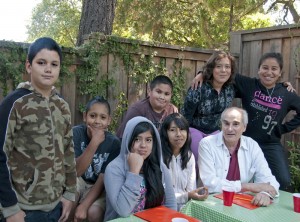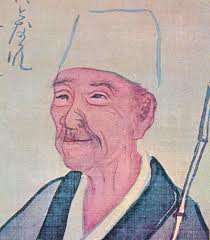During the past school year, I tutored math and language arts in a local fifth-grade class, so when Public School Success Team (PSST), the homegrown  non-profit that ran the tutoring program, decided to encourage a continuing flow of student enthusiasm over the summer, I volunteered to lead a course. Conducted al fresco in my backyard, it consisted of six weekly sessions in close textual analysis. I called it Curious Readers.
non-profit that ran the tutoring program, decided to encourage a continuing flow of student enthusiasm over the summer, I volunteered to lead a course. Conducted al fresco in my backyard, it consisted of six weekly sessions in close textual analysis. I called it Curious Readers.
My plan was to use accessible poetry and short-short flash fiction to stimulate thought. I began with:
In these sessions we will discover that some things we read are like icebergs. But when I say that, do I mean that these written works are frozen and floating? Of course not. What I mean is that, like an iceberg, there’s more than meets the eye. And if a writer refers to a “lonely cloud,” does he mean that the cloud feels some kind of emotion?
 We started easy. I gave them Humpty Dumpty to read and asked, “Who was Humpty? And did he fall or was he pushed?” None of the participants—six to ten came each week—had any experience in this sort of intellectual challenge. Many of my questions (and that’s all I did…ask questions) got I-don’t-know’s, to which I responded, “I don’t know is the ONLY wrong answer.”
We started easy. I gave them Humpty Dumpty to read and asked, “Who was Humpty? And did he fall or was he pushed?” None of the participants—six to ten came each week—had any experience in this sort of intellectual challenge. Many of my questions (and that’s all I did…ask questions) got I-don’t-know’s, to which I responded, “I don’t know is the ONLY wrong answer.”
It only took one week for the students’ responses to become almost uniformly interesting and enthusiastic. Hands were shooting up. Over the next several weeks we did Robert Frost, Carl Sandburg, Percy Shelley, and many others. A sample of their comments about a one-sentence story by Bruce Holland Rogers illustrates their intellectual insertion into the process. (I have changed the students’ names.)
He left the village of his birth, crossed the mountains, crossed the seas,
saw great cities, learned a few words in a dozen tongues, met the high
and the low, and returned after years of wandering to the village of his
birth where for the rest of his life he suffered nostalgia for his village as
it had been when he left.
Q: Why did he leave his village?
…Santiago: To get a job.
…Cesar: To travel, and the mountains means challenges, and it wasn’t easy.
Q: Why does the writer mention that he “crossed the sea”?
…Corazon: Because that means he went very far away.
Q: He left a village and “saw great cities.” Why mention that?
…Corazon: Cities and villages are very different.
…Ariela: A village is small. A city is big…like Denver.
…Cesar: Or across the sea…like Paris.
Q: What makes a city great?
…Corazon: Restaurants, hotels, landmarks, different languages.
…Ariela: National parks.
…Cesar: Size, museums.
Q: What does it mean that he “learned a few words in a dozen tongues”?
…Cesar: He went to lots of places and learned the same words in different languages.
…Coco: It’s a big job to learn how to talk the language.
Q: Who were the “high and low”?
…Cameron: Royalty and servants.
…Ariela: People of different size.
Q: He “returned after years of wandering.” So what?
…Arcadia: He visited lots of places.
…Santiago: He was walking around everywhere.
…Cesar: But when he got back the village had changed.
Q: He “suffered nostalgia.” Why?
…Ariela: Because his village changed, and he liked the way it used to be. He missed the good old times.
Q: Was his journey a success or a failure?
…Leon: Both. Might have fun when he went to the other places, and when he came back the village had changed, and he liked it better the way it was.
 After reading and discussing haiku written by Basho in the fifth week, the final session was devoted to analyzing haiku written by the students. Here’s Arcadia’s poem and the discussion that followed:
After reading and discussing haiku written by Basho in the fifth week, the final session was devoted to analyzing haiku written by the students. Here’s Arcadia’s poem and the discussion that followed:
My small wings
I am forbidden to fly
I’m a flightless bird
…Cesar: Forbidden is the most interesting word in the poem. It means you can’t fly…not that you are not able, but someone or something has stopped it.
…Leon: It’s forbidden because there is a hunter out there, and it has been prevented.
Q: Why does this bird have small wings?
…Cesar: We had a cockatoo and had its feathers clipped. Maybe that.
…Coco: It could be deformed. But that would not mean forbidden. It would mean unable.
…Arelia: Maybe this is about a person who thinks of herself as a bird.
…Leon: I think it’s about a young girl who is not allowed to leave her house and go out with boyfriends.
The candle is lit. PSST’s goal is to get these kids to graduate from high school. They have promised each a $2,000 college scholarship if they do and gotten a commitment (with a certificate suitable for framing) from Sonoma State University guaranteeing admission if they graduate and meet the minimum entrance requirements. If the kids, the large majority of whom are children of Hispanic immigrants, succeed (and PSST will work with them continuously through middle school and high school), almost all of them will be the first in their family to go to college.
Paying forward.






3 Comments on “Curious Readers”
These are fifth-graders? Wonderful.
PSST sounds like a good organization, and you’ve made a meaningful start with these kids.
This makes me so ridiculously proud of my Pop.
What an amazing opportunity for those kids! What a great way to learn.
I had a creative writing teacher in high school who taught in a way that really changed what I wanted to do in life. I am a journalism major now, and I could not be happier in my choice!
Keep doing what you are doing…it makes a difference!
Comments are closed.